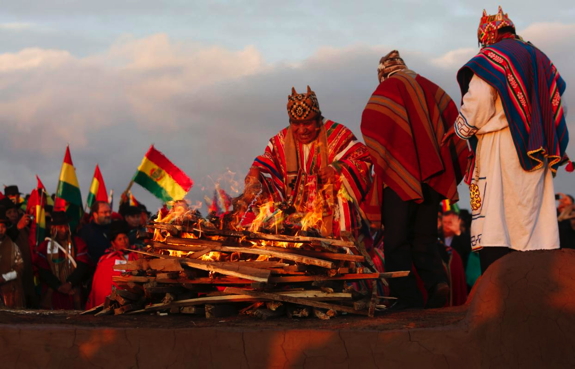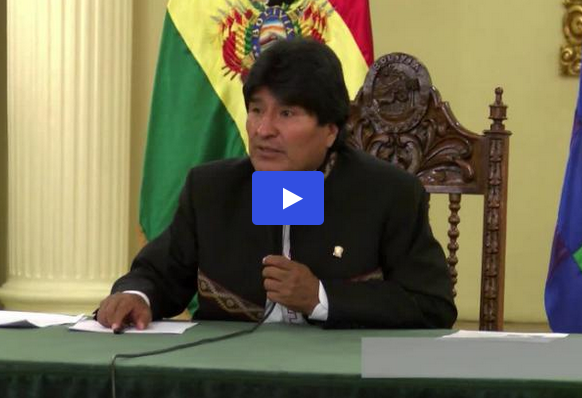
(above) Bolivian President Evo Morales (C) and his Vice President Alvaro Garcia Linera (2-L) attend an indigenous ceremony celebrating his nine years, eight months and 27 days in power on October 21, 2015 in the ruins of Tiwanaku, 70km from La Paz (AFP Photo/Aizar Raldes)
Evo Morales celebrates his long rule in Bolivia
October 21, 2015 - yahoo.com
Tiwanaku (Bolivia) (AFP) - Bolivian President Evo Morales, South America's longest serving leader, celebrated his record longevity in power Wednesday in a dawn ceremony at a pre-Inca religious complex.
(below) An Aymara spiritual leader showers alcohol over a pyre during an offering ceremony for Pachamama or Mother Earth to give thanks for the time served by Bolivia's President Evo Morales. The Andean president celebrated on Wednesday as the leader who's led Bolivia for the most years continuously, almost 10 years, surpassing the mark of one of Bolivia's founders, Marshal Andres de Santa Cruz. "We're making history by setting a record, but not just in terms of time," he said, pointing out his government's achievements. (AP Photo/Juan Karita)

Morales, a socialist and member of the indigenous Aymara community, said that Bolivia's longest ruling leader had been Andres de Santa Cruz, in power for nine years, eight months and 26 days between 1829 and 1839.
"Today, we have surpassed the record. We are here to pay homage to the process of change, to our people, and to this shift over nine years, eight months and 27 days," Morales said.
(below) Bolivia's President Evo Morales (C), accompanied by Vice President Alvaro Garcia Linera (4th L top), Foreign Minister David Choquehuanca (4th R top) and witch doctors, speaks during a ceremony at the Tiahuanaco ruins, north of La Paz, October 21, 2015. Morales celebrated on Wednesday his record tenure as Bolivia's president, in power for nine years, eight months and 27 days, according to local media. REUTERS/Bolivian Presidency/Handout via ReutersA
Morales, 55, an outspoken critic of neoliberal economics and US policies, also listed his accomplishments since assuming office on January 22, 2006.
(below) A man stands near a newspaper stand where a front page displays an image of Bolivia's President Evo Morales (R) with the words, "I have the energy to continue", in La Paz, October 22, 2015. Morales celebrated on Wednesday his record tenure as Bolivia's president. REUTERS/David Mercado
His current term ends in 2020, but a referendum to be held February 21, 2016, will determine whether he should be allowed to run for another five-year term that could take his presidency into 2025.
(below) Bolivia's President Evo Morales speaks during the inauguration of the sports arena called "Coliseo Ban Ki-Moon" in Vila Vila, south of Cochabamba, October 11, 2015. U.N. Secretary-General Ban Ki-moon is in Bolivia for the World People's Conference on Climate Change and the Defense of Life, which is held before the Climate Change Conference in Paris. REUTERS/David Mercado
He underscored Wednesday the support he has received from Cuba's Fidel Castro, Brazil's former president Luiz Inacio da Silva and the late presidents Hugo Chavez of Venezuela and Nestor Kirchner of Argentina.
(below) U.N. Secretary-General Ban Ki-moon (C) makes the same gesture as Bolivia's President Evo Morales in Vila Vila, south of Cochabamba, October 11, 2015. Ban Ki-moon is in Bolivia for the World People's Conference on Climate Change and the Defense of Life, which is held before the Climate Change Conference in Paris. REUTERS/Bolivian Presidency/Handout via Reuters
The speech was preceded by a religious ceremony at Tiwanaku, a pre-Inca site that is considered a spiritual center and sacred ground for Andean Indians near Lake Titicaca.
(below) U.N. Secretary-General Ban Ki-moon (L) and Bolivia's President Evo Morales interact with a girl during the inauguration of a sports arena called "Coliseo Ban Ki-Moon" in Vila Vila, south of Cochabamba, October 11, 2015. Ban Ki-Moon is in Bolivia for the World People's Conference on Climate Change and the Defense of Life, which is held before the World Climate Change Conference in Paris. REUTERS/David Mercado
(below) U.N. Secretary-General Ban Ki-moon (L) talks with Bolivia's President Evo Morales during the inauguration of a sports arena called "Coliseo Ban Ki-Moon" in Vila Vila, south of Cochabamba, October 11, 2015. Ban Ki-Moon is in Bolivia for the World People's Conference on Climate Change and the Defense of Life, which is held before the World Climate Change Conference in Paris. REUTERS/David Mercado TPX IMAGES OF THE DAY
(below) A woman arranges a garland made with coca leaves placed on Bolivia's President Evo Morales (R) as France's Foreign Minister Laurent Fabius (C) looks on before the inauguration of the World People's Conference on Climate Change and the Defense of Life, prior to the World Climate Change Conference, in Tiquipaya, Bolivia, October 10, 2015. Almost 150 nations, including major emitters led by China and the United States, have submitted plans to the United Nations for curbing greenhouse gas emissions blamed by the U.N. for causing more floods, droughts and heat waves. France will host the conference in Le Bourget, near Paris, from November 30 to December 11, 2015. REUTERS/David Mercado
(below) U.N. Secretary-General Ban Ki-moon (2nd L) and Bolivia's President Evo Morales (2nd R) pose with residents of Vila Vila during the inauguration of a sports arena called "Coliseo Ban Ki-Moon" in Vila Vila, south of Cochabamba, October 11, 2015. Ban Ki-Moon is in Bolivia for the World People's Conference on Climate Change and the Defense of Life, which is held before the World Climate Change Conference in Paris. REUTERS/David Mercado
(below) France's Foreign Minister Laurent Fabius (L) and Bolivia's President Evo Morales arrive at the World People's Conference on Climate Change and the Defense of Life, prior to the World Climate Change Conference, in Tiquipaya, Bolivia, October 10, 2015. Almost 150 nations, including major emitters led by China and the United States, have submitted plans to the United Nations for curbing greenhouse gas emissions blamed by the U.N. for causing more floods, droughts and heat waves. France will host the conference in Le Bourget, near Paris, from November 30 to December 11, 2015. REUTERS/David Mercado
(below) U.N. Secretary-General Ban Ki-moon (C), Bolivia's President Evo Morales (R) and Vila Vila's Mayor Emiliano Reyes Garcia arrive at the inauguration of a sports arena called "Coliseo Ban Ki-Moon" in Vila Vila, south of Cochabamba, October 11, 2015. Ban Ki-Moon is in Bolivia for the World People's Conference on Climate Change and the Defense of Life, which is held before the World Climate Change Conference in Paris. REUTERS/David Mercado
(below) Bolivia's President Evo Morales (L) arranges a Tarabuco's "poncho" to U.N. Secretary-General Ban Ki-moon at the World People's Conference on Climate Change and the Defense of Life, ahead of next month's World Climate Change Conference in France, in Tiquipaya, Bolivia, in this October 10, 2015 handout photo provided by Bolivian Presidency. Almost 150 nations, including major emitters led by China and the United States, have submitted plans to the United Nations for curbing greenhouse gas emissions blamed by the U.N. for causing more floods, droughts and heat waves. France will host the conference in Le Bourget, near Paris, from November 30 to December 11, 2015. REUTERS/Bolivian Presidency/Handout via Reuters
